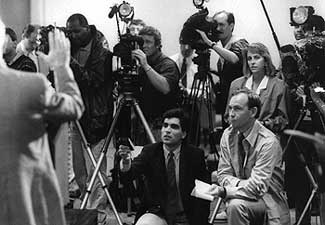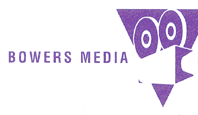|
EXPERIENCED
MEDIA TRAINING
More
and more organizations recognize the importance of media training.
Perhaps you need to prepare for a major press conference,
or you are concerned about a business issue that is potentially
sensitive. Either way, getting the most out of the media is
a management skill that can be learned and practiced like
any other. The secret is understanding how TV, Radio, Magazines
and Newspapers really work.
At Bowers Media Group, we have the advantage of being
media insiders. And through our broadcast and corporate television
work over the last ten years, we are acutely aware of the
media and PR challenges facing organizations.

Importantly, our trainers are real journalists, producers
and presenters. Their strength is their in-depth, current
experience of the media from the other side of the fence.
Bruce
Bowers, nationally known as an investigative reporter,
has over 25 years broadcast experience. He has won national
and regional awards and is known for a hard hitting style
of interviewing. Once you have weathered an on-camera
confrontation interview with him, you have faced the toughest
questions you will face in a real interview situation. Bowers
has worked for WBTV and WSOC-TV as well as NBC News Channel.
His work also has appeared nationally on ABC, CBS, and CNN
and he has led news crews on assignments to Russia, Estonia,
the People's Republic of China, Hong Kong, and Japan. He has
conducted media training sessions in the Carolinas for The
Hosiery Association, as well as groups in medicine, insurance,
and hazardous waste disposal.
We have solid experience and credibility to offer to your
organization.
FACING THE MEDIA
Perhaps
you will have a specific crisis within your organization
hit the news and you have little time to prepare. You may
have a policy to announce to the media in a way to that
does not seem defensive. Or you may simply recognize the
need to be prepared. That's why our guiding principle is
to tailor-make each media training day to your requirements.
Each candidate is asked to complete a short questionnaire
beforehand, which outlines their background and any experience
they may have had with press, radio and television.
The media training day itself is a lively mix of real life
examples, practice interviews and honest, informed assessment
of your on-camera presentation. In our experience, a good
media training day doesn't just help de-mystify the media;
it can also make a real contribution to the development of
corporate strategies and goals.
The following topics are usually covered:
The Media:
Who are they?
What do they want?
Do you really want to speak to them?
How does the media see You?
Letting go of "bad feelings"
Being approachable - and available
Getting to know individual journalists
What is a story?
How are stories created?
The Press Release and other news sources
What journalists look for
The newsroom:
What is it like to be in a newsroom?
Newspapers, radio and television: They are all different.
The
telephone interview:
Casual conversations
Reactive or Proactive
On and Off The Record
No Comment and other words to avoid
How to prepare
What questions should be answered
The role of the Press Officer
Print interviews:
How to answer questions with confidence
How to gain greater control of interview situations
The interviewee's rights
The reporter's rights
Radio
interviews:
Dealing with Live and Recorded interviews
The studio environment
"Down the Line" interviews
Radio Phone-ins
Dealing with callers
How to stay calm and say everything you want to say
How to use your voice effectively
Television
interviews:
Why television is different
How taped items are edited
"Tricks of the Trade"
Live Television: on location and in the studio
What to do - and what not to do
Body Language and dress
Press Conference Mechanics:
The press conference Mechanics of a good news conference
How to keep your "main point" from being edited out.
Full course review Maintaining ongoing media relations
|


